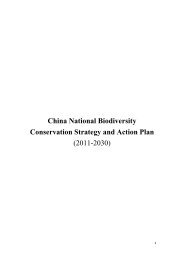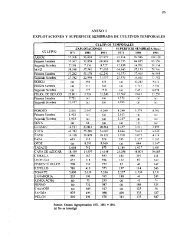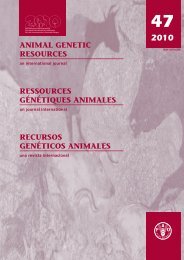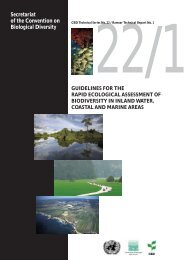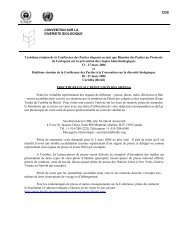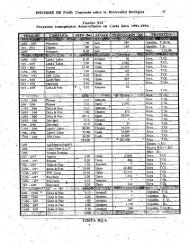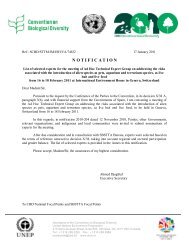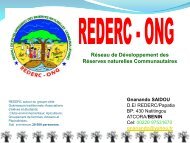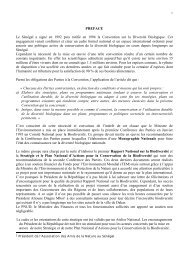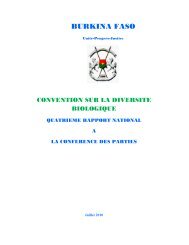English - Convention on Biological Diversity
English - Convention on Biological Diversity
English - Convention on Biological Diversity
Create successful ePaper yourself
Turn your PDF publications into a flip-book with our unique Google optimized e-Paper software.
130<br />
COUNTRY STUDY FOR BIODIVERSITY OF THE REPUBLIC OF MACEDONIA<br />
7.2. Direct causes of biodiversity loss<br />
The direct causes of biodiversity loss are many and varied. Most of them are<br />
comm<strong>on</strong> to all types of biodiversity, while some are specific to either flora, fauna or<br />
ecosystems:<br />
• Inadequate management of the waters of aquatic ecosystems.<br />
• Drainage of marshes and swamps.<br />
• C<strong>on</strong>structi<strong>on</strong> of hydropower reservoirs in river gorges.<br />
• Lack of water treatment plants (for riverine and lake ecosystems).<br />
• Mine excavati<strong>on</strong>s and other geological works.<br />
• C<strong>on</strong>structi<strong>on</strong> of ski lifts, transmissi<strong>on</strong> lines, televisi<strong>on</strong> transmitters and other antenna<br />
systems.<br />
• Loss of habitats (or their parts) during unplanned expansi<strong>on</strong> of urban centres,<br />
weekend settlements and tourist-recreati<strong>on</strong> z<strong>on</strong>es.<br />
• Modificati<strong>on</strong> of habitats.<br />
• Fragmentati<strong>on</strong> of habitats, due mainly to traffic infrastructure, where highways<br />
intersect habitats that are important as vertebrate corridors (particularly for large<br />
mammals). When aquatic habitats are artificially fragmented, recommendati<strong>on</strong>s for<br />
maintaining ecological minimum flows in watercourses are not followed.<br />
• Destructi<strong>on</strong> of areas with natural vegetati<strong>on</strong> (halophytes and meadows).<br />
• Unc<strong>on</strong>trolled destructi<strong>on</strong> of forests through forest fires, through clearing, in order to<br />
provide building land, for the c<strong>on</strong>structi<strong>on</strong> of roads and railroads, for the expansi<strong>on</strong><br />
of tourist settlements and through forest desiccati<strong>on</strong>.<br />
• Unc<strong>on</strong>trolled collecti<strong>on</strong> of medicinal plants and wild animals.<br />
• Illegal collecti<strong>on</strong> of rare plants (especially endemic plants) by professi<strong>on</strong>al and<br />
commercial collectors, illegal collecti<strong>on</strong> of birds’ eggs, certain species of butterflies<br />
etc.<br />
7.3. Underlying causes of biodiversity loss<br />
The basic factors which have led to the current unfavourable state of the envir<strong>on</strong>ment<br />
in the Republic of Maced<strong>on</strong>ia in all of its spheres, including biodiversity, include general<br />
historical processes, a bad socioec<strong>on</strong>omic situati<strong>on</strong>, an unstable political situati<strong>on</strong>,<br />
inadequate spatial planning and inappropriate land use.<br />
In the desire to accomplish ec<strong>on</strong>omic development at any cost, a general trend<br />
toward the erosi<strong>on</strong> of moral and traditi<strong>on</strong>al societal values can be observed, neglecting<br />
the principle of sustainable development. Instead, natural resources are used bey<strong>on</strong>d the<br />
limits of their sustainability, which produces a real threat of extincti<strong>on</strong> for endangered<br />
plant and animal species and varieties, and thus impinges up<strong>on</strong> traditi<strong>on</strong>al rural<br />
landscapes. Aiding in this process is the poor awareness by the citizens of Maced<strong>on</strong>ia of<br />
the issues surrounding the c<strong>on</strong>servati<strong>on</strong> of nati<strong>on</strong>al biological resources and the<br />
possibilities for their sustainable use. This situati<strong>on</strong> is especially felt within biological<br />
communities (wild plants and animals). On the <strong>on</strong>e hand, the State has not developed<br />
legal regulati<strong>on</strong>s to facilitate the sustainability of populati<strong>on</strong>s. On the other, in a rush to<br />
achieve quick profits (often by people living at the bare subsistence level), wild species<br />
are collected unc<strong>on</strong>trollably and without any care for their normal reproducti<strong>on</strong> or for<br />
envir<strong>on</strong>mental impacts resulting from their disappearance.



